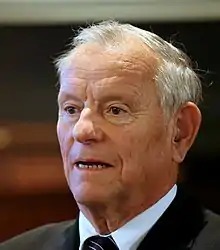Helmut Rauch | |
|---|---|
 Helmut Rauch in Budapest, 2013 | |
| Born | 22 January 1939 Krems an der Donau, Austria, Nazi Germany |
| Died | 2 September 2019 (aged 80) Vienna, Austria |
| Nationality | Austrian |
| Alma mater | Vienna University of Technology |
| Awards | Wilhelm Exner Medal (1985)[1] |
| Scientific career | |
| Fields | Physics |
| Doctoral students | Anton Zeilinger |
Helmut Rauch (22 January 1939 – 2 September 2019) was an Austrian physicist. He was especially known for his pioneering experiments on neutron interference.
Rauch studied Physics at Vienna University of Technology and worked at the Institute of Atomic and Subatomic Physics there. He was also affiliated with the Forschungszentrum Jülich and the Institut Laue-Langevin in Grenoble.
In his Nobel Prize Lecture in 2022, Anton Zeilinger spoke about what his mentor, Helmut Rauch taught him. In a part of his speech, he said: "From my mentor, I learnt that you can have ideas. Which are wrong in a sense that the arguments are wrong but the idea is right. That intuition can be much stronger than a logic argument".[2]
Neutron interference experiments
In 1974, Rauch, together with Ulrich Bonse and Wolfgang Treimer, demonstrated the first matter wave interference of neutrons. This demonstrated the wave-like nature of neutrons for the first time and was another experimental proof that not only photons can be described by waves, but also massive particles. Further they demonstrated the fundamental symmetry of spin 1/2 particles under rotation.
Death
Rauch died on 2 September 2019, aged 80, following a short illness in Vienna.[3]
References
- ↑ Editor, ÖGV. (2015). Wilhelm Exner Medal. Austrian Trade Association. ÖGV. Austria.
- ↑ "The Nobel Prize in Physics 2022". NobelPrize.org. Retrieved 2023-01-04.
- ↑ "Kernphysiker Helmut Rauch verstorben" (in German). Wien Orf.at. 5 September 2019.
- Rauch, H.; Bonse, U. (1979). Neutron Interferometry. Oxford: Clarendon Press.
- Rauch, H.; Badurek, G.; Zeilinger, Anton (1988). Matter Wave Interferometry. North Holland.
- Rauch, H.; Werner, S. A. (2000). Neutron Interferometry. Clarendon Press.
External links
- Wittgenstein-Preis für Helmut Rauch 7 October 2006 in ORF Wien (in German), last visited 25 April 2009
- Helmut Rauch on the Homepage of the Austrian Research Agency (in German), last visited 25 April 2009